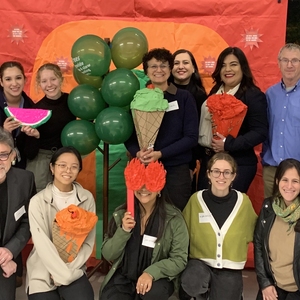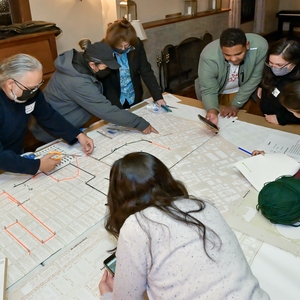USC Urban Trees Initiative
University of Southern California
Project Overview
The USC Urban Trees Initiative (USC Trees) brings together faculty, staff, and student researchers at the University of Southern California to help the City of Los Angeles and local nonprofits grow an equitable and resilient urban forest. To address environmental inequalities and prepare for a warming climate, the City of L.A. is planting 90,000 new trees in areas of greatest need. However, the tree-planting process is not simple. How do we identify areas of greatest need? What do we do when there is no space to plant in those areas? Since August 2020, USC experts in spatial mapping, landscape architecture, and air quality monitoring have been working with the City and local communities to answer challenging questions about where, how many, and what kinds of new trees to plant in disadvantaged areas of East and South L.A.
Background
Los Angeles is getting hotter every year. During a heatwave, temperatures can reach 140 degrees on asphalt streets and 120 degrees on typical sidewalks. Climate change is expected to make things even hotter.
Access to green space can save lives: a 2022 study found that one in four lives currently lost during heat waves in Los Angeles could be saved with cooling measures such as planting trees. Unfortunately, low-income Angelenos of color who are at highest risk of exposure to climate threats live in the most tree-poor areas of the city.
This inequity is what motivated the launch of the Urban Trees Initiative at the University of Southern California in 2020. In partnership with the City of L.A.’s Department of Public Works and first-ever City Forestry Officer, USC Trees began studying a 5-square mile area on the Eastside of L.A. In April 2021, USC Trees published its first strategic vision for tree planting opportunities in the eastside communities of Lincoln Heights, El Sereno, and Ramona Gardens.
The pilot study was so well received that USC Trees expanded this research from August 2021 to December 2022 into three additional neighborhoods: Boyle Heights, University Park, and City Terrace. The goal of this research is to identify opportunities and constraints for improving green infrastructure and recommend data and equity-driven planting solutions for L.A. City and nonprofit tree planting partners.
Goals
USC Trees aims to help the City of Los Angeles meet the commitment established in its City Sustainability Plan (also known as L.A.’s Green New Deal) to plant 90,000 new trees in neighborhoods with the greatest need. The research will equip L.A. to target its resources strategically and equitably. The goal is to present plans for building more environmentally just and climate resilient neighborhoods through innovative data and meaningful engagement with residents.
Implementation
A multidisciplinary team of scientists came together to answer pressing questions about where and how to plant trees in areas of greatest need. The team includes USC faculty, staff, and student researchers along with project management staff from USC’s Public Exchange Office. Community engagement efforts were supported by USC’s University Relations Office. The USC team met bi-weekly with project partners at the City of Los Angeles to track progress and milestones. The team also met frequently with nonprofit planting organizations, such as North East Trees and City Plants.
Timeline
In April 2021, USC Trees published its first strategic vision for tree planting opportunities in the eastside communities of Lincoln Heights, El Sereno, and Ramona Gardens. From August 2021 to December 2022, USC Trees expanded upon the pilot study and took a deep dive into the areas of Boyle Heights, University Park, and City Terrace/East L.A. to identify priority planting locations based on the greatest need. 10 StoryMaps were developed and published on the Public Exchange website outlining the team’s research (https://publicexchange.usc.edu/urban-trees-initiative/).
Financing
USC Trees was made possible with the generous facilitation of funding support from USC President Dr. Carol L. Folt and funding from the USC Dornsife College of Letters, Arts and Sciences. The team was awarded a $50,000 grant to jumpstart the research collaboration and partnership with the City of L.A. in August 2020. In October 2022, USC Trees was among three USC sustainability research projects that were awarded funding as part of a larger $8.8 million settlement that USC received from a 2016 class-action lawsuit.
The costs associated with the initiative include partial coverage of faculty and staff salaries on the project, funding for Postdoctoral Research Associates as well as multiple graduate and undergraduate students. Costs also include equipment, materials and supplies that are necessary to track and monitor progress. Other recurring costs include community outreach and field work support.
Results
USC Trees is supporting the current and next generation of urban foresters and building care and community around trees. Since 2020, over 200 residents from Lincoln Heights, El Sereno, Ramona Gardens, Boyle Heights, City Terrace/East LA, and University Park have been engaged in events led by USC Trees. USC Trees research is actively being used by local organizations, City officials, and other researchers to inform their work on equitably growing an urban forest in Los Angeles. For example, North East Trees, a community-based environmental non-profit, used USC data and design renderings to inform its planting selection of 300 trees around the Ramona Gardens Housing Project.
Lessons Learned
It is important to prioritize funding for community engagement to make sure that residents' voices are being included at all stages of the research process. When organizing community engagement, residents’ experiences should lead the conversations rather than listening to academic credentialed experts. Community members are the local experts and should be recognized and fairly compensated for sharing their expertise.


